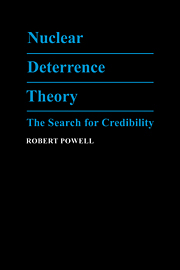Book contents
- Frontmatter
- Contents
- Preface
- 1 Introduction
- 2 The nuclear revolution and the problem of credibility
- 3 The dynamics of nuclear brinkmanship
- 4 Stability and longer brinkmanship crises
- 5 Crisis stability in the nuclear age
- 6 Stability and the lack of control
- 7 The strategy of limited retaliation
- 8 An appraisal
- Appendix Some introductory notes on game theory
- References
- Index
Preface
Published online by Cambridge University Press: 13 October 2009
- Frontmatter
- Contents
- Preface
- 1 Introduction
- 2 The nuclear revolution and the problem of credibility
- 3 The dynamics of nuclear brinkmanship
- 4 Stability and longer brinkmanship crises
- 5 Crisis stability in the nuclear age
- 6 Stability and the lack of control
- 7 The strategy of limited retaliation
- 8 An appraisal
- Appendix Some introductory notes on game theory
- References
- Index
Summary
The first atomic attack, on August 6, 1945, killed more than seventy thousand people. In Hiroshima, John Hersey described some of the horror of that day: the terrible burns; the soldiers who apparently had been looking up when the bomb exploded, “their faces were wholly burned, their eyesockets hollow, the fluid from their melted eyes had run down their cheeks”; the haunting silhouettes of people etched in stone by the nuclear flash. That was one bomb on one city. A general nuclear war today would be unimaginably worse.
This book is about the relation between force and states' efforts to further their ends in the nuclear age. It uses abstractions and mathematical models to try to understand this relation better. These tools may help to bring the essence of this relation into sharper focus, but these clean abstractions may also make it easier to forget what they represent. Should the event that, it may seem, is too casually referred to in the coming chapters as “disaster” actually occur, hundreds of millions will be dead. Thinking about these issues requires a certain amount of detachment, but we must guard against becoming too detached.
In 1780, John Adams wrote to his wife, Abigail, “I must study politics and war that my sons may have liberty to study mathematics and philosophy.
- Type
- Chapter
- Information
- Nuclear Deterrence TheoryThe Search for Credibility, pp. vii - viiiPublisher: Cambridge University PressPrint publication year: 1990



